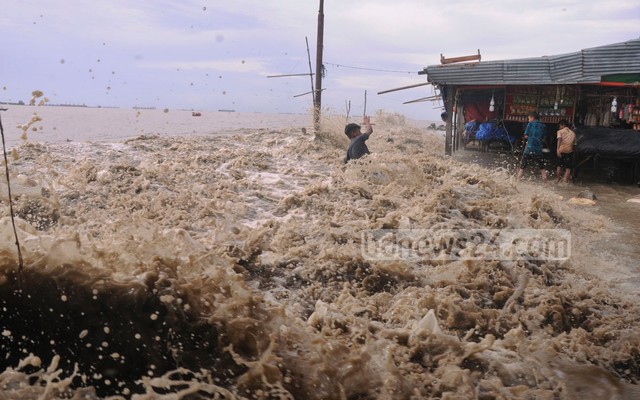News >> Environment
Bangladesh must invest Tk 3.2tr over 15 years to cope with climate change: Expert
 08 Jan, 2016
08 Jan, 2016
The sum is 8 percent more than the current financial year’s national budget and big enough to fund the construction of 11 Padma river bridges.
A document prepared by the Ministry of Environment and Forests for the climate change summit held in Paris last month gives this indication of the financial requirement.
The document says Bangladesh will have to invest Tk 213.33 billion annually, until 2030, in 10 fields, including health and agriculture, to combat the effects of climate change.
Fazle Rabbi, Coordinator of Palli Karma Sahayak Foundation’s (PKSF) community climate change project, says Bangladesh, a country especially vulnerable to climate change effects, must start work now to get this money as compensation from developed nations.
Rabbi, who took part in the Paris meet, said quoting an Asian Development Bank (ADB) report that Bangladesh was at present losing about 2 percent of its GDP annually because of climate change.
“By 2050, this loss would be more than 8 percent. In order to adjust to the changes, the country will have to invest $40 billion or Tk 3.2 trillion until 2030.”
The Copenhagen climate meet had agreed to create a $100 billion fund to help countries affected by climate change.
But the initiative remained stalled over disagreement regarding countries’ share of contribution and the fund disbursement process.
But a decision was reached in Paris with rich nations agreeing to give, after 2020, $100 million annually for climate-vulnerable nations. They also agreed to subsequently increase the aid money.
Low-income countries and island nations will get precedence over others in the grant of financial help to fight natural disasters and make adaptations.
Rabbi said ministries in Bangladesh must be better equipped to prepare projects to get money from the ‘Green Climate Fund’.
“We must increase our capability. All countries will try to avail themselves of this fund. So, money will be hard to get unless the projects are good and submitted in time.”
Only enlisted establishments would be entitled to money from the green fund, he said.
Rabbi also underscored various aspects of damage caused by climate change.
“Rainfall has already become erratic. Rain that is supposed to spread over three days now comes pouring down in one day. There is unseasonal rain, the frequency of cyclones has increased and so have the number of droughts.”
He said the maximum impact of climate change was being felt in agriculture, the sector that accounts for 18 percent of Bangladesh’s national income and about 87 percent of employment.
The salinity was causing the spread of diseases and affecting infrastructure.
“Earlier, Aman rice was the main crop. Now, erratic rain and the ease of lifting groundwater (for irrigation) have made Boro rice the staple crop. Besides, almost the whole of the country’s southern region has become saline,” Rabbi said.
The Paris agreement has fixed global warming limits to less than two degrees above pre-industrial level.
It would come into force after 55 countries that account for 55 percent of greenhouse gas emission ratify it.
The PKSF coordinator said, “The USA and China are responsible for 50 percent of global emissions. But merely their ratification will not solve the problem; all 55 countries that account for 55 percent of the emission must do so.”
Earlier, 40 developed nations had been asked to cut emissions, but in Paris, all countries were asked to reduce greenhouse gas emissions in ‘accordance with their ability’.
Rabbi said Bangladesh, too, would have to cut fuel, transport and industrial greenhouse gas emission by 5 percent within 2030.
“All countries barring Nicaragua have consented to the Paris agreement, and, hopefully, it will become binding,” Rabbi said.
Source: bdnews24

